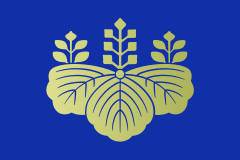Government of Japan facts for kids

Seal of the Government
|
|
| Polity type | Unitary parliamentary constitutional monarchy |
|---|---|
| Constitution | Constitution of Japan |
| Legislative branch | |
| Name | National Diet |
| Meeting place | National Diet Building |
| Upper house | |
| Name | House of Councillors |
| Lower house | |
| Name | House of Representatives |
| Executive branch | |
| Head of State | |
| Title | Emperor |
| Currently | Naruhito |
| Head of Government | |
| Title | Prime Minister |
| Currently | Yoshihide Suga |
| Appointer | Emperor |
| Cabinet | |
| Name | Cabinet of Japan |
| Leader | Prime Minister |
| Appointer | Prime Minister |
| Headquarters | Prime Minister's Official Residence |
| Judicial branch | |
| Supreme Court of Japan | |
| Seat | Chiyoda |
The Government of Japan is the central government that runs the country of Japan. It works like a team with three main parts: the people who make laws, the people who carry out laws, and the people who make sure laws are fair. The government follows rules set by the Constitution of Japan.
Japan is a unitary state. This means it has one main central government for the whole country. It also has 47 smaller areas called administrative divisions. The Emperor of Japan is the country's Head of State, but his job is mostly ceremonial. He doesn't have power over the government.
Instead, the government is led by the Prime Minister of Japan. The Prime Minister is the main leader and chooses a group of ministers to form the Cabinet of Japan. The Cabinet is the part of the government that puts laws into action and manages the country's daily business.
Contents
How Japan's Government Works
Japan's government is a parliamentary constitutional monarchy. This means:
- It has an Emperor (monarchy), but his powers are limited by a written set of rules called the Constitution.
- The main power is with the National Diet, which is like a parliament. The people elect its members.
- The Prime Minister, who leads the government, is chosen by the National Diet.
The Three Branches of Government
Just like many other countries, Japan's government is divided into three main parts, called branches. Each branch has a different job to make sure power is balanced.
Making Laws: The Legislative Branch
The part of the government that makes laws is called the legislature. In Japan, this is the National Diet. It's a special kind of legislature because it has two houses:
- The House of Councillors is the upper house.
- The House of Representatives is the lower house.
People directly elect the members of both houses. The Constitution says the National Diet is the highest power in the country. This means the people, through their elected representatives, have the ultimate say in how the country is run.
Carrying Out Laws: The Executive Branch
The executive branch is the part of the government that carries out the laws. In Japan, this is mainly the Cabinet. The Cabinet is made up of the Prime Minister and other Ministers of State.
The Prime Minister is the leader of the Cabinet and is chosen by the National Diet. After being chosen, the Emperor officially appoints the Prime Minister. The Cabinet is responsible for directing and controlling the government and the country's public services.
Interpreting Laws: The Judicial Branch
The judicial branch is made up of the courts. Their job is to interpret laws and make sure they are fair. The highest court in Japan is the Supreme Court. There are also many other smaller courts.
The courts have the power to decide if laws follow the Japanese Constitution. This is called judicial review. It means they can check if a law is constitutional. Judges are independent, which means they are not controlled by the executive or legislative branches. This helps them make fair decisions. Judges are chosen or appointed by the Cabinet and can only be removed through a special process called impeachment if they do something seriously wrong.
Images for kids
-
National Diet Building, Nagatachō, Chiyoda-ku, Tokyo
-
Supreme Court Building, Chiyoda-ku, Tokyo
See also
 In Spanish: Gobierno de Japón para niños
In Spanish: Gobierno de Japón para niños
 | Janet Taylor Pickett |
 | Synthia Saint James |
 | Howardena Pindell |
 | Faith Ringgold |










